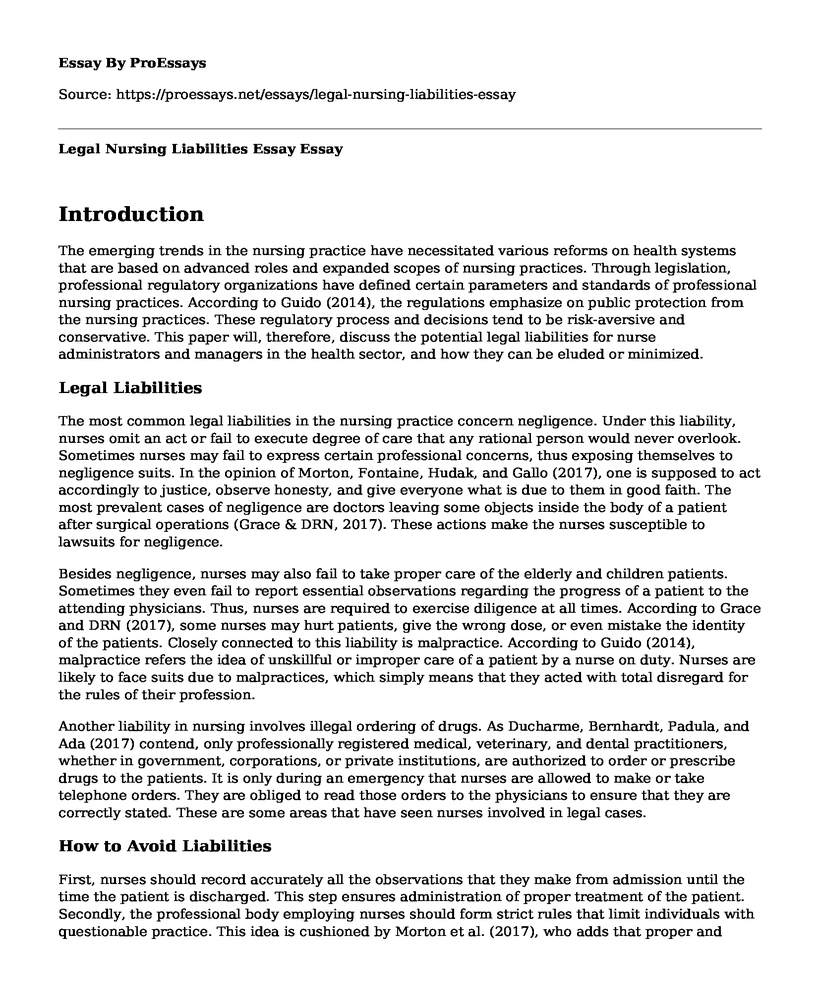Introduction
The emerging trends in the nursing practice have necessitated various reforms on health systems that are based on advanced roles and expanded scopes of nursing practices. Through legislation, professional regulatory organizations have defined certain parameters and standards of professional nursing practices. According to Guido (2014), the regulations emphasize on public protection from the nursing practices. These regulatory process and decisions tend to be risk-aversive and conservative. This paper will, therefore, discuss the potential legal liabilities for nurse administrators and managers in the health sector, and how they can be eluded or minimized.
Legal Liabilities
The most common legal liabilities in the nursing practice concern negligence. Under this liability, nurses omit an act or fail to execute degree of care that any rational person would never overlook. Sometimes nurses may fail to express certain professional concerns, thus exposing themselves to negligence suits. In the opinion of Morton, Fontaine, Hudak, and Gallo (2017), one is supposed to act accordingly to justice, observe honesty, and give everyone what is due to them in good faith. The most prevalent cases of negligence are doctors leaving some objects inside the body of a patient after surgical operations (Grace & DRN, 2017). These actions make the nurses susceptible to lawsuits for negligence.
Besides negligence, nurses may also fail to take proper care of the elderly and children patients. Sometimes they even fail to report essential observations regarding the progress of a patient to the attending physicians. Thus, nurses are required to exercise diligence at all times. According to Grace and DRN (2017), some nurses may hurt patients, give the wrong dose, or even mistake the identity of the patients. Closely connected to this liability is malpractice. According to Guido (2014), malpractice refers the idea of unskillful or improper care of a patient by a nurse on duty. Nurses are likely to face suits due to malpractices, which simply means that they acted with total disregard for the rules of their profession.
Another liability in nursing involves illegal ordering of drugs. As Ducharme, Bernhardt, Padula, and Ada (2017) contend, only professionally registered medical, veterinary, and dental practitioners, whether in government, corporations, or private institutions, are authorized to order or prescribe drugs to the patients. It is only during an emergency that nurses are allowed to make or take telephone orders. They are obliged to read those orders to the physicians to ensure that they are correctly stated. These are some areas that have seen nurses involved in legal cases.
How to Avoid Liabilities
First, nurses should record accurately all the observations that they make from admission until the time the patient is discharged. This step ensures administration of proper treatment of the patient. Secondly, the professional body employing nurses should form strict rules that limit individuals with questionable practice. This idea is cushioned by Morton et al. (2017), who adds that proper and constant trading to the nurses, blended with law enforcement to the guilty nurses, is a sure way to reduce liabilities in nursing. Additionally, nurses should be charged in a court of law and sentenced accordingly, as a warning to other negligent colleagues (Morton et al., 2017). Importantly, the entire hospital management should have an efficient supervisory system, which coordinates potential risks such as delegation, records, and related practices.
Further remedial actions can be taken in colleges. Nursing students should be under strict supervision by their instructors. They ought to be given duties and assignments that correspond to their level of training, competency, and experience. This process encourages consultation and guidance, necessary for working with patients. This will enable them to understand issues that they are likely to face in the job and the implications in the legal arena (Guido, 2014). Also, as the supervisors assess students, they frequently outline weaknesses and strengths of various policies, thus diagnosing measures that avoid liability in practice.
References
Ducharme, M. P., Bernhardt, J. M., Padula, C. A., & Adams, J. M. (2017). Leader influence, the professional practice environment, and nurse engagement in essential nursing practice. Journal of Nursing Administration, 47(7/8), 367-375
Grace, P. J., & DRN, P. (Eds.). (2017). Nursing ethics and professional responsibility in advanced practice. Burlington, MA: Jones & Bartlett Learning.
Guido, G.W. (2014). Legal and ethical issues in nursing (6th ed.). Upper Saddle River, NJ: Prentice Hall
Morton, P. G., Fontaine, D., Hudak, C. M., & Gallo, B. M. (2017). Critical care nursing: A holistic approach. Philadelphia: Lippincott Williams & Wilkins.
Cite this page
Legal Nursing Liabilities Essay. (2022, Apr 04). Retrieved from https://proessays.net/essays/legal-nursing-liabilities-essay
If you are the original author of this essay and no longer wish to have it published on the ProEssays website, please click below to request its removal:
- Paper Example on Trauma as Public Health Issue
- Texas Judicial Election Essay Example
- Factors That Make up Matesky and Bundy Criminal Profiling Paper Example
- Essay Example on Elderly Wound Care: Diagnosis Is Key for Healing
- COVID-19: Unveiling the Cause of Global Pandemics - Essay Sample
- Essay Example on Establishing Federal Bureau of Prisons & Prison Industries: Innovating Correctional Management
- Collaborative Strategies for Addressing SARS: A Multidisciplinary Approach - Free Paper







